Inside L.A.’s Highland Park music scene, a hub of young artists, labels and vinyl stores
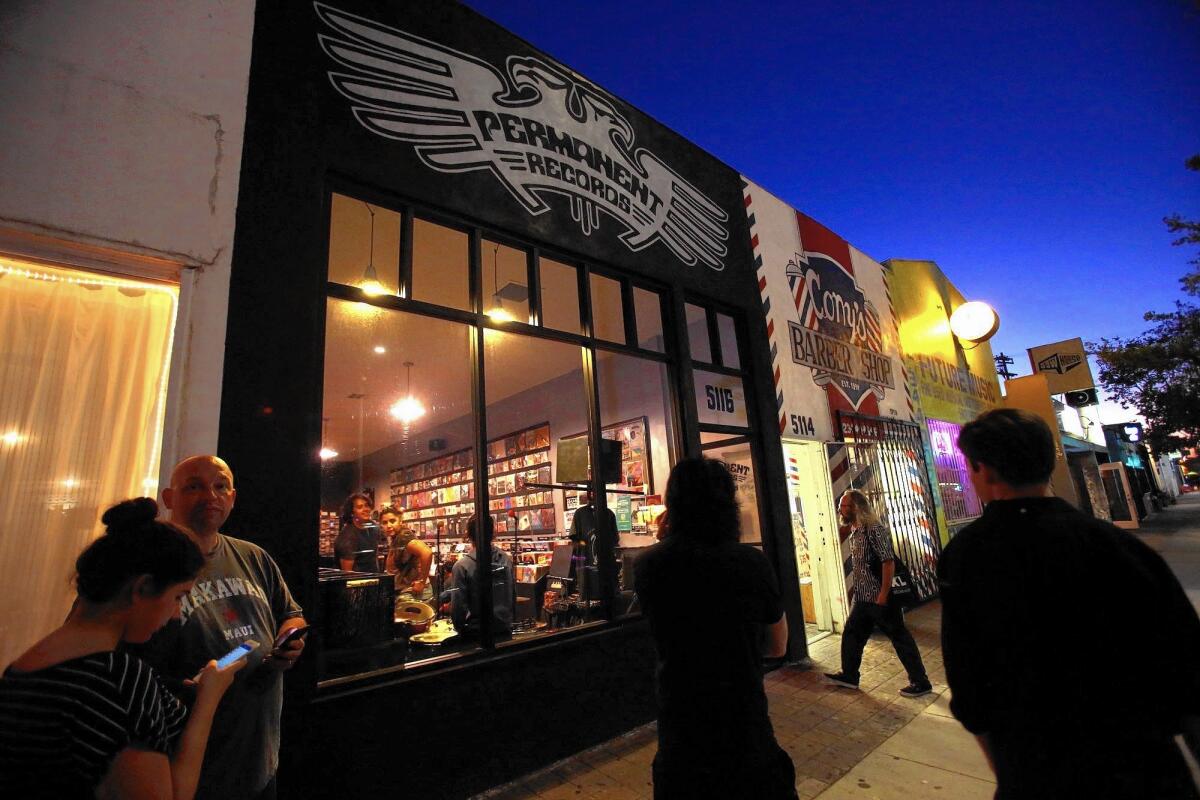
- Share via
When Alexis Rivera, a music manager who lives and works in the northeast Los Angeles enclave of Highland Park, exits his little storefront office, he has on occasion witnessed a culture collision between a famous comedian and a reclusive hip-hop producer that to him typifies the thriving state of the neighborhood.
"I will see Marc Maron and Madlib out in front of our office having coffee from next door, talking on their phones and waiting for people," said Rivera on a recent afternoon at his office near the corner of York Boulevard and Avenue 50. "They don't know each other. They probably haven't even heard of each other. But it's no greater symbol of the neighborhood that these two super-talented people co-exist."
Live Music
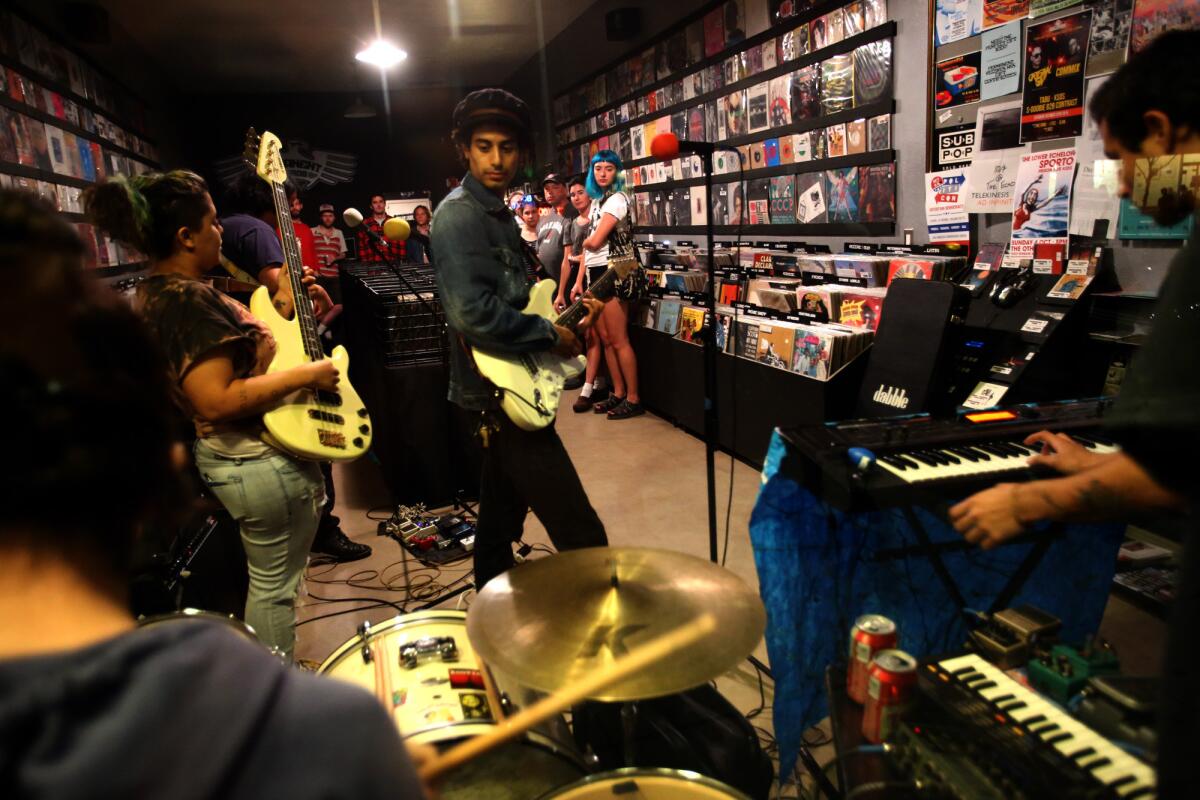
The Southern California band Dabble performs inside Permanent Records on York Avenue in Highland Park.
The Southern California band, Dabble, performs inside Permanent Records on York Avenue in Highland Park. (Genaro Molina / Los Angeles Times)
Such is life in one of Los Angeles' music centers, a hub whose redevelopment boom has prompted trend stories about an inflated housing market and another round of gentrification. Amid the activity to reimagine spaces and invigorate less profitable storefronts, the area continues to offer a sense of boundless opportunity for young artists.
SIGN UP for the free Essential Arts & Culture newsletter >>
"I love this neighborhood," said Gimme Gimme Records owner Dan Cook, who relocated his New York shop to Highland Park after 18 years in the East Village. "It's in this really sweet spot right now where it's not all taken over and corporate. It's such a great mix right now."
Even to many longtime residents who earn a living in the music business, the bounty of independent work currently being created, swapped, bought and sold in northeast Los Angeles — Highland Park and neighboring Eagle Rock, Glassell Park and Mount Washington — is notable.
Like the 1960s Laurel Canyon folk scene, the Sunset Strip's 1980s hair metal heyday, Compton's seminal early '90s gangsta rap era and Silver Lake's vibrant indie rock dominance in the '90s and '00s, Highland Park and environs are dense with genre-spanning musical creativity in 2015.
"There's a lot of talent in these hills," said Rivera, whose Echo Park Records manages artists including Grammy-winning Daft Punk collaborator Todd Edwards and French act Melody's Echo Chamber. Those passing the company's office off York might recognize the Echo Chamber's Melody Prochet from the billboard that for months featured her face in close-up. That same spot, reserved by Rivera to showcase his artists' work, now features art by Johnny Jewel of the Chromatics: a textless image of a multicolored keyboard.
Listen now: The Music of Highland Park
Five excellent record stores operate in Highland Park alone: Mount Analog, Wombleton, Permanent, Gimme Gimme and Avalon. A sixth, Rappcats, offers the occasional pop-up shop to augment its back-office business as the headquarters of Now-Again Records, the music-related imprint Sinecure Books and Madlib's music and merchandise.
"You can do a whole vinyl crawl in an afternoon," said Larry Hardy, sitting among his record collection at his Eagle Rock home. Hardy's garage-rock institution In the Red Records will celebrate its 25th anniversary in 2016.
"It's the weirdest thing," he said. "When I first moved here in 2001, there was nothing around here. Now there's all these record stores, eateries, bars in the area." The added bonus? "My bands were always other places," he said. "Now I'm working with loads of local bands. They're coming over to listen to their test pressing. I don't have to FedEx it across the country."
Golden Oldies
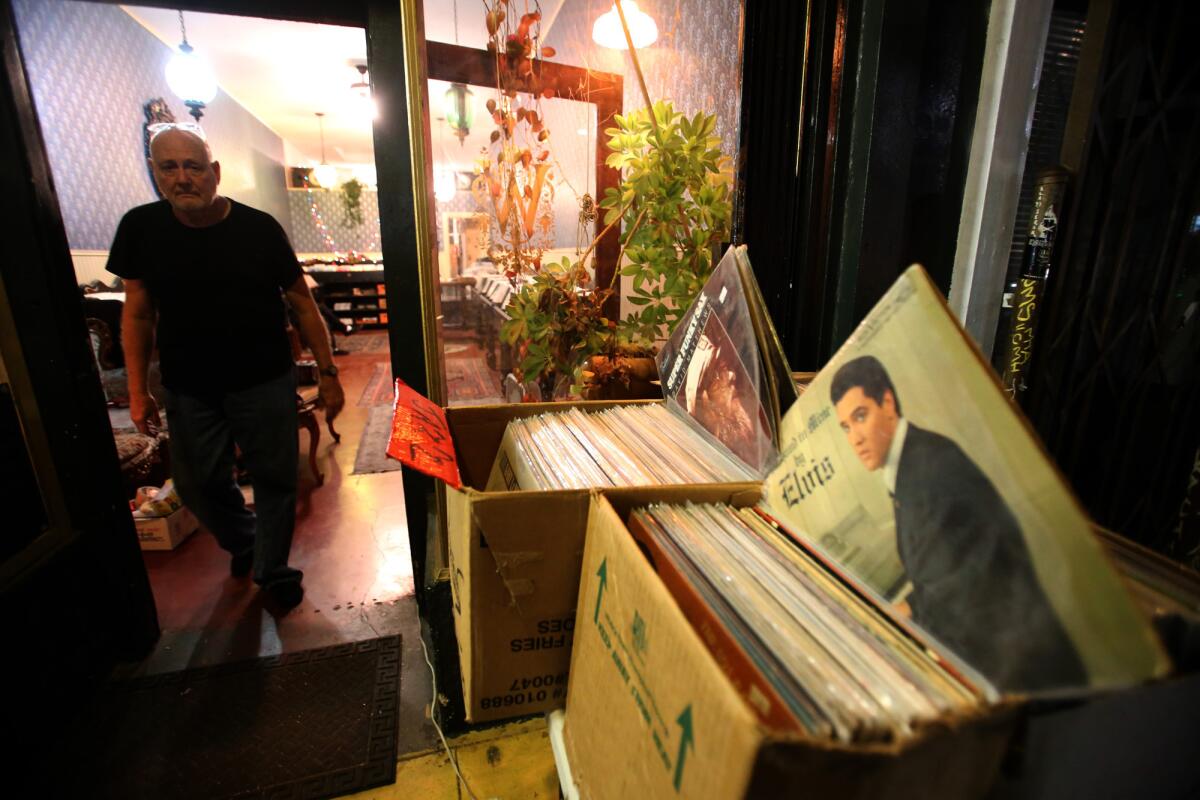
Tom Justice sells vinyl records for his business Mount Washington Vinyl Country Club in front of Wombleton Records in Highland Park.
Tom Justice sells vinyl records for his business Mount Washington Vinyl Country Club in front of Wombleton Records in Highland Park. (Genaro Molina / Los Angeles Times)
Hardy has released records by a few of his new neighbors: The inventive rock guitarist and songwriter Ty Segall owns a house and studio down the block. Their compatriot John Dwyer of Thee Oh Sees recently relocated from San Francisco.
Add in avant pop provocateur Ariel Pink, beat-pop experts Purity Ring, ascendant producer MNDSGN, shaggy-haired Low End Theory resident and beat conductor the Gaslamp Killer, transplanted Mississippian Dent May, the meditative experimental electronic tones of married couple Matthewdavid and Diva Dompé, together and separately. And on and on.
See the most-read stories in Entertainment this hour >>
Stones Throw owner Chris Manak, best known for deejaying as Peanut Butter Wolf, found a spot on Figueroa Street in 2001. A roommate was Otis Jackson Jr., a.k.a. Madlib, whose seminal studio the Bunker was on the property. Manak explored Silver Lake and Echo Park, but wanted cheaper rent and needed space for his record collection. (He justifies his needs in the title to a recent Stones Throw documentary: "My Vinyl Weighs a Ton.")
Stones Throw recently took over two storefronts below its second floor offices and soon-to-be completed studio space.
Street Scene
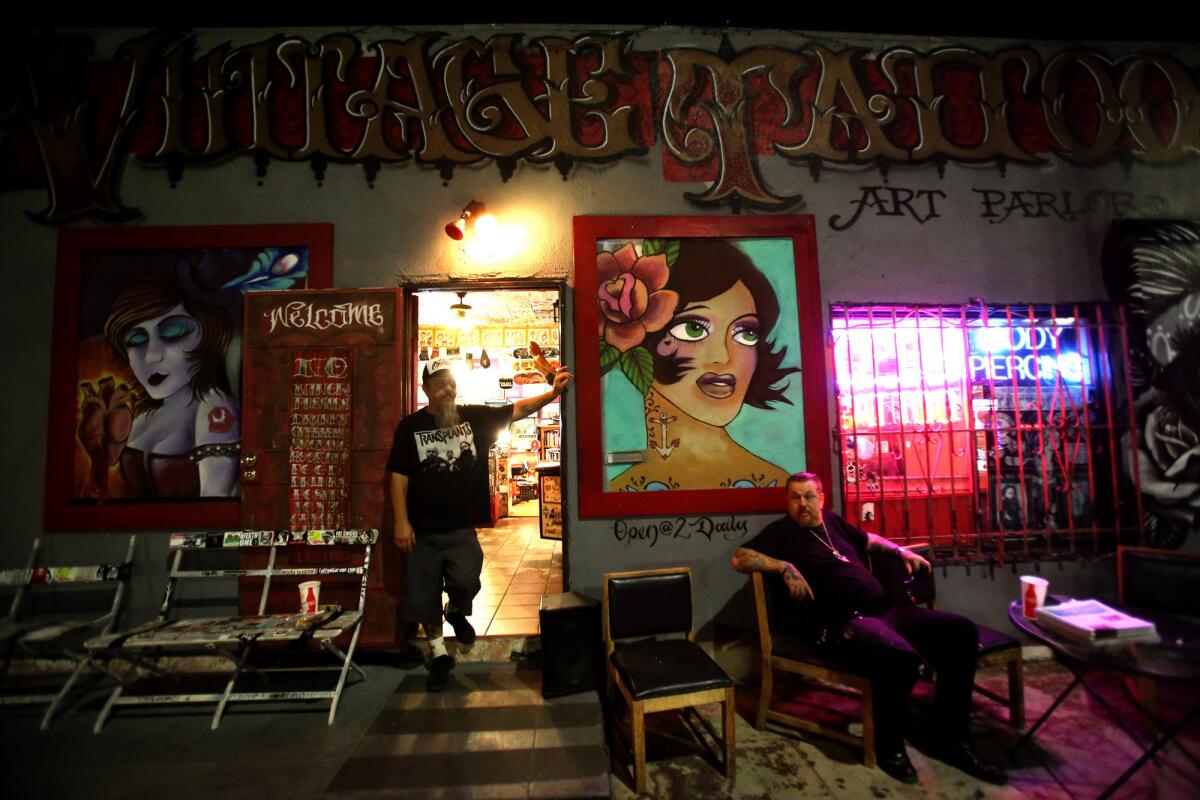
Tattoo artists Odie, left, and his brother Baba, wait for customers in front of Vintage Tattoo Art Parlor on York Avenue in Highland Park.
Tattoo artists Odie, left, and his brother Baba, wait for customers in front of Vintage Tattoo Art Parlor on York Avenue in Highland Park. (Genaro Molina / Los Angeles Times)
They've been joined in the area by labels including versatile dance-rock-accented Innovative Leisure; new-disco brand Italians Do It Better; experimental electronic labels Friends of Friends and Leaving Records; rock and reissue label Permanent (which owns its namesake show); and soul and funk reissue label Now-Again. A few weeks back owners of the Indiana-based independent label group Secretly Canadian were spied looking for office space along York. (Secretly co-owner Chris Swanson said the company hasn't yet decided on a location.)
Want a doughnut? You can buy one of the best in the city from Donut Friend, opened by Drive Like Jehu drummer Mark Trombino. Need an instrument? Future Music has been a Highland Park mainstay for years, operated by Green on Red co-founder Jack Waterson. Beer? The Hermosillo has serviced the neighborhood for years, though it's much hipper than it used to be; the folk artist Laura Marling used to down her pints and write in a back booth. Even the neighborhood eye doctor is musical: Dr. Elliott Caine, the self-described Jazz Optometrist whose work can be heard on recordings by Beck, Beastie Boys, Bobby Matos and others, has a shop on York. It's a few doors down from the York, a gastro pub that only a few months ago got its live music permit. Its ownership includes Morrissey guitarist Jesse Tobias. According to Elden Man, manager of boutique vinyl shop Wombleton Records, when owner Ian Marshall returns with an overseas shipment of Smiths-related used vinyl, customers get starry-eyed when he tells them that the York is co-owned by Morrissey's guitarist and that Morrissey has shot pool at Johnny's Bar. Man says many make a block-long pilgrimage to have a pint on sacred ground.
Artistic draw
It says something about Highland Park's personality that in March when Jay Z's music streaming service Tidal announced its arrival, the New York rapper gathered his co-investors to shoot the festivities far removed from Beverly Hills. They weren't drawn to the music or art scenes, though, when they shot at the Fig House. Rather, the platinum pop posse needed a location absent paparazzi.
Born as a bedroom township of mostly transplanted Midwesterners that was annexed by the city of Los Angeles in 1895, the area experienced white flight starting in the 1950s, and gradually transitioned into a largely Latino district.
The artist and printmaker Richard Duardo, who died in 2014, described the 1960s Highland Park of his youth in an interview with KCET-TV as "a Republican bastion of old blue-haired women."
Duardo co-founded a community arts space called the Centro de Arte Público. Located in the building that now houses Stones Throw, the Centro served as a center for politically charged art and music. "Richard started working with Eastside punk bands and then mixing art and music," said Lisa Duardo of her brother's early work on Figueroa. Early punk bands including the Gears, X's Exene Cervenka and John Doe and others played there.
Permanent Records
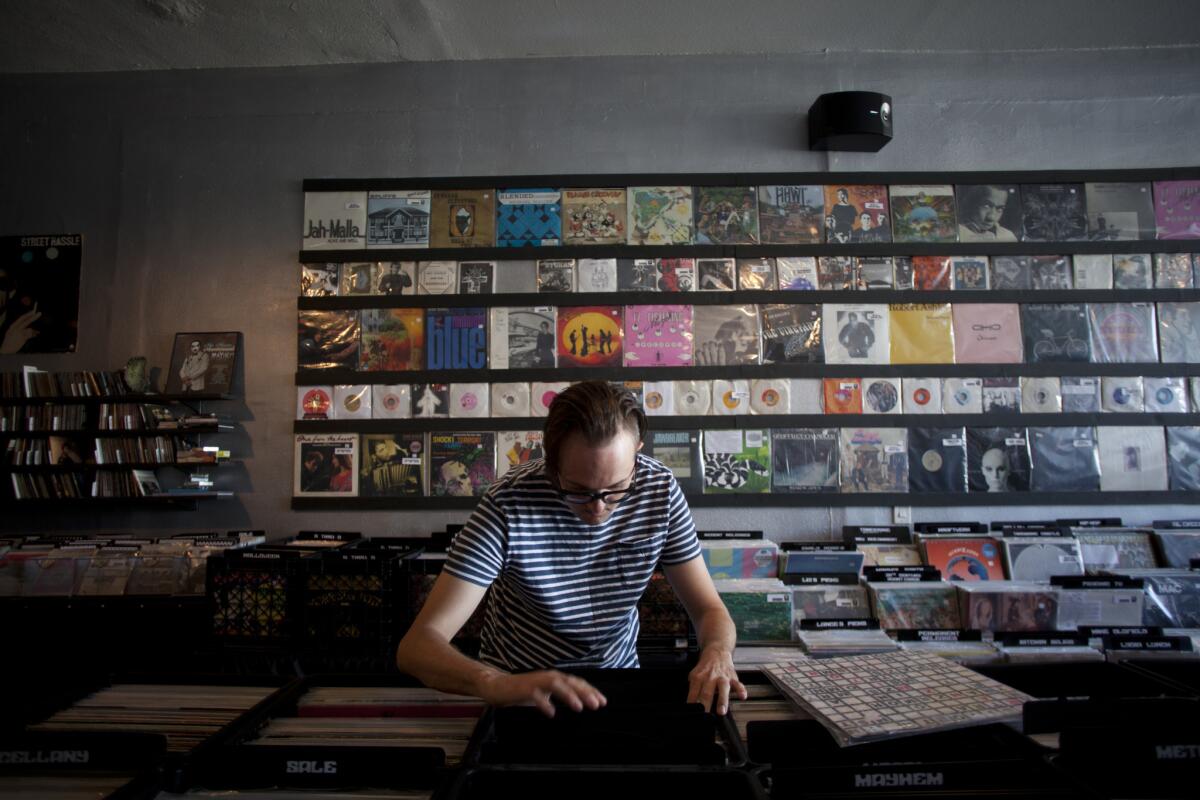
Matthew Walsh, of Highland Park, peruses the records at Permanent Records in Highland Park.
Matthew Walsh, of Highland Park, peruses the records at Permanent Records in Highland Park. (Jenna Schoenefeld / For the Times)
NEWSLETTER: Get the day's top headlines >>
The problem, according to Lisa: "The neighborhood wasn't ready for it at the time because white flight was just ending — or still going on. Loud music, a lot of Latinos and white punk kids coming from the Hollywood area or wherever to listen to punk music? The police were always coming out here." Her brother would race home to fetch their mother, a neighborhood activist cordial with local police officers.
"She would come up and say, 'Hey, it's a bunch of kids showing art and playing music,'" recalled Lisa. "They would still shut the show down, but nobody got busted or hauled away." Before moving his studio downtown and co-founding Fatima Records and Modern Multiples fine art print studio, Richard helped guide neighborhood kids away from the streets. "Richard would say, 'Come into the studio if you're going to tag something. Put it on paper.'"
She stresses that the area's artistic bent was long a draw. "The physical beauty of the area brought creative types here. They never left. There's just periods of quietness, or the money is calling them over the hill."
Rage Against the Machine singer and rapper Zack De La Rocha opened his own art center in the mid-1990s, Regeneracion, since shuttered, to serve the neighborhood. Mr. T's Bowl was becoming a hub for punk bands when a new wave of musical investment arrived, but the creativity was all around.
Highland Park
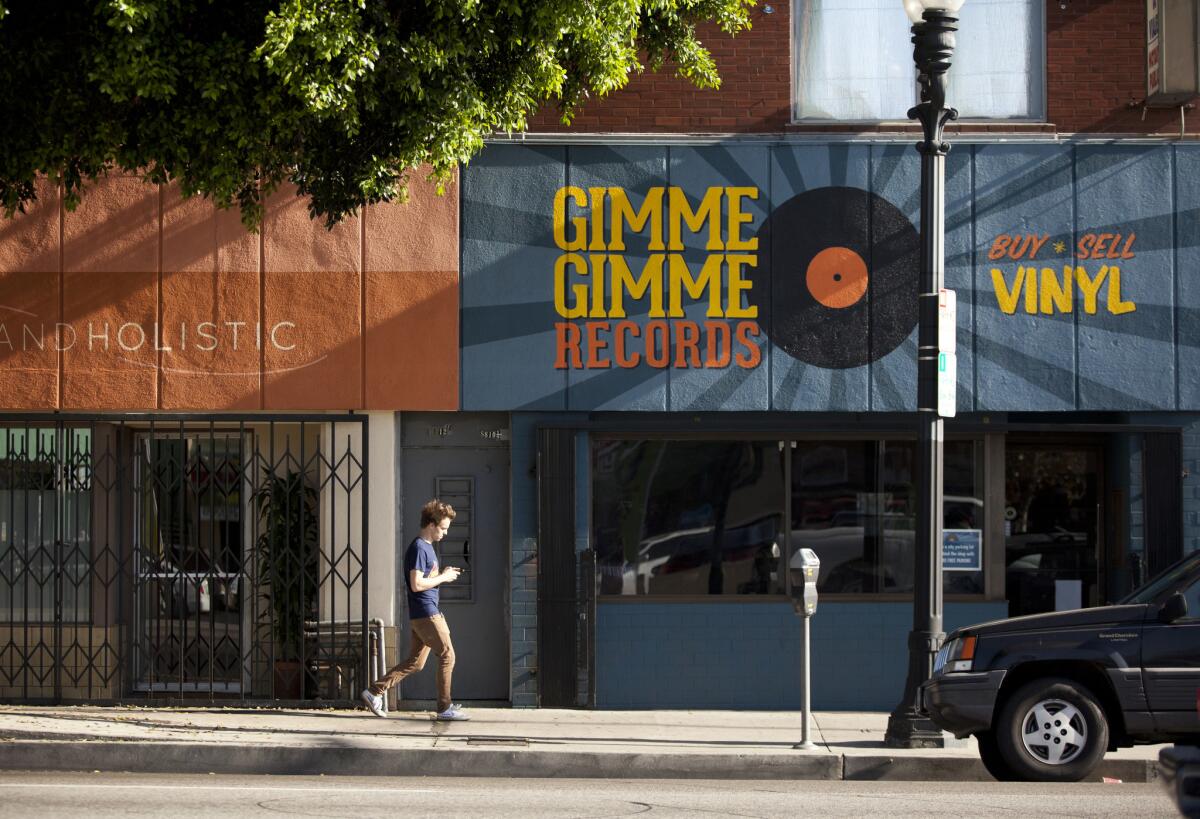
Gimme Gimme Records in Highland Park.
Gimme Gimme Records in Highland Park. (Jenna Schoenefeld / For the Times)
"When we first set up shop here, there were still people doing amazing work," said Eothen "Egon" Alapatt, who was Stones Throw's general manager before leaving to run his Now-Again Records and manage Madlib. He has watched the area as it has gentrified. It's become safer and lot more comfortable, he said. "It became this place full of people who wouldn't normally set foot in a neighborhood like this.
"Madlib used to be an outlier," added Alapatt. "All of the sudden he became one of many people who were putting out records that people knew all around the world that were based in Highland Park."
Where to plug in?
There's still not a great performance venue, though. Mr. T's Bowl, the decrepit old bowling alley that has hosted underground parties and gigs on and off since at least the 1990s, is closed after having recently been purchased for renovation by the 1933 Group. The renovated bowling alley is slated to open some time next year.
A few years ago an empty church was transformed into an excellently programmed venue called the Church on York. Permitting issues and protests from the community scuttled the venue, and it was gone as quickly as it arrived.
But ask a resident music geek for tips, and entire sub-scenes emerge. The art and DJ collective Honey Power Club has hosted backyard parties featuring bands including Bleached, King Tuff, Chastity Belt and Cherry Glazerr. DJ Marion Hodges regularly spins records on Saturdays at the York before her Saturday night KCRW shift. Sundays at the same location, some of the neighborhood's best area session players offer a rotating roster of acts booked by musician Patrick Duniven.
The Chicago-born Permanent Records, which opened a satellite store in Eagle Rock but moved to the York business district a few years ago, hosts in-store rock performances most Saturdays. A few weeks ago indie rock heroes Titus Andronicus packed the shop with fans who spilled out onto the sidewalk.
Thriving community
When Chris Manak and his label Stones Throw were hunting for space after running it out of his Mount Washington home, they found a spot at Avenue 56 and Figueroa and they've been there since. They later learned it used to be Duardo's Centro. "Even when I moved to Mount Washington, they were saying, 'Oh, it's going to be the next thing,'" said Manak. "They've been saying that for 10 years."
Last year Manak and some investors tried to buy Mr. T's Bowl. According to Manak, they were outbid by a million dollars.
That trend has hit producer Madlib, whose studio in the heart of the Figueroa district has hosted luminaries including Kanye West, Talib Kweli and others. The artist, who has collaborated with or produced tracks for artists including J Dilla, MF Doom, De La Soul, Freddie Gibbs and dozens of others, doesn't speak to the press.
But according to his manager, Now-Again and Rappcats owner Alapatt, due to an ownership change at his current location Madlib is looking for a new spot to move his studio and storied record collection after a recent rent hike.
"The nice thing about Highland Park is that there's still a bunch of raw spaces," said Alapatt. "Highland Park's still so big that you can move around in it. "
One of the first new record stores in the area was Mount Analog, a specialty store opened on Figueroa in 2012 that specializes in electronic and experimental music, and has since earned a reputation as one of the most influential shops in the country. When its owners, Mahssa Taghinia and Zane Landreth, were looking for a storefront, they were drawn to the streetscape.
"Ten years ago, even five years ago, there wasn't really a street where you could just go and chill and run into people," said Landreth. "And out here, in that three blocks on York you definitely have that. There are places to chill and hang out. Stop at the coffee shop. Go to the record store. That community vibe where you can walk down the street and run into people makes a really big town like Los Angeles less isolating."
"We were able to sequester ourselves here," added Now-Again's Alapatt. "And at a certain point it became really obvious that that wasn't going to happen anymore. It was like, cool, there are people who understand how special this place is. It just doesn't feel like any other part of Los Angeles."
Now if he can only find a good location for Madlib. Apparently there's an old tire repair shop available, tucked away in a secret spot unaffected by the boom times.
Follow me on Twitter @LilEdit
The biggest entertainment stories
Get our big stories about Hollywood, film, television, music, arts, culture and more right in your inbox as soon as they publish.
You may occasionally receive promotional content from the Los Angeles Times.








